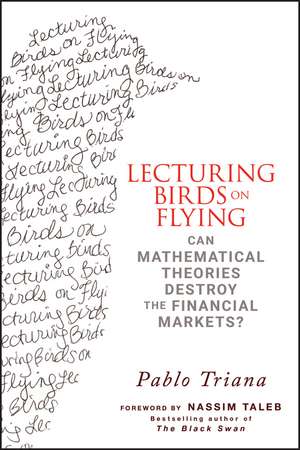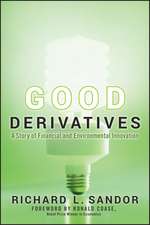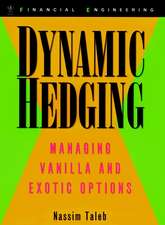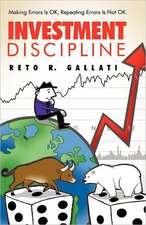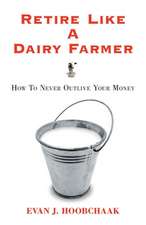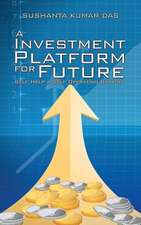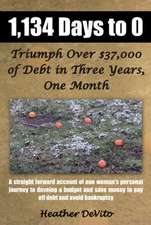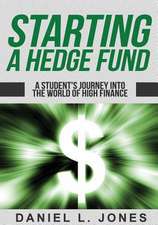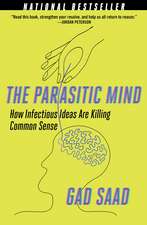Lecturing Birds on Flying – Can Mathematical Theories Destroy the Financial Markets?
Autor P Trianaen Limba Engleză Hardback – 27 mai 2009
Leading and contrarian thinkers have been talking for years about the conflicts between theoretical and real finance. Nassim Taleb first addressed the issue in his technical treatise on options, Dynamic Hedging. Now, in Lecturing Birds on Flying, Pablo Triana moves the conversation to a narrative that anyone can follow, and explains how it is that theoretical finance can fail dramatically in the real world. The heart of the book, though, isn′t about technicalities, but instead explores how widely accepted theories that are applied daily cause our world real harm. Many times, it′s the quantitative models that hedge funds and investment banks use (and regulators and rating agencies embrace) that lead to market implosions. These so–called models end up offering false guidance and misplaced certainty, and sanction unsavory behavior. In fact, these models were largely responsible for the stock market crash of 1987, the LTCM crisis of 1998, the credit crisis of 2008, and many other blow–ups big and small. Pablo Triana has been writing about the limits of these types of mathematics for several years; now he reveals exactly what this means for our markets and why blind self–enslavement to quantitative dictums puts us at great peril.
Pablo Triana (New York, NY, and Madrid, Spain) has successful derivatives experience at all levels: trading floor, professor, consultant, and author. He is a frequent contributor to business publications, including the Financial Times, Forbes.com, Breakingviews, and Risk magazine, among others. His prior book is Corporate Derivatives. Triana holds a master of science from New York University, Stern and an MA from American University.
Preț: 169.89 lei
Nou
32.51€ • 33.82$ • 26.84£
Carte disponibilă
Livrare economică 25 martie-08 aprilie
Specificații
ISBN-10: 0470406755
Pagini: 400
Dimensiuni: 152 x 229 x 23 mm
Greutate: 0.61 kg
Editura: Wiley
Locul publicării:Hoboken, United States
Public țintă
Institutional investors, market professionals, corporate finance executives, hedge fund managers.Descriere
Praise for Lecturing Birds On Flying "Finally, a book taking a critical look at quantitative finance models, illuminating both their flawed fantasy assumptions as well as the uncritical use of such models on Wall Street, in many cases, leading to billion dollar losses. Pablo Triana knows both the financial industry and the academic community from the inside. A must–read for anyone interested in finance."
—Dr. Espen Gaarder Haug, trader, thinker, and author of Derivatives Models on Models
"A thoroughly readable explanation of the problems that have beset the models and quantitative techniques that have underpinned so much of finance in recent years. If only the bankers had heeded this message a few years before, we might not be in such a big mess today."
—Gillian Tett, Assistant Editor of the Financial Times, overseeing global financial markets coverage, and author of Fool′s Gold
"Pablo Triana dismembers quantitative finance, in theory and in practice, with expertise, anger,and an excellent eye for the illuminating anecdote. By the time he has finished marshalling his evidence, his call to replace complex equations with something more like common sense sounds like, well, common sense."
—Edward Hadas, Assistant Editor at Breakingviews.com; and author of Human Goods, Economic Evils: A Moral Approach to the Dismal Science
"Pablo Triana is an entertaining and engaging writer, even on the dry subject of finance theory. His debunking of conventional wisdom is a treat."
—Pauline Skypala, Editor, FTfm, Financial Times
"Triana′s book is an unrelenting fusillade of detailed and irrefutable arguments against financial theorems and those who teach them. It should, by rights, spark a revolution in both investment banks and business schools. But, at the very least, it is required reading for anyone who would regulate the finance industry."
—Felix Salmon, Finance Blogger, Reuters
Textul de pe ultima copertă
Praise for Lecturing Birds On Flying "Finally, a book taking a critical look at quantitative finance models, illuminating both their flawed fantasy assumptions as well as the uncritical use of such models on Wall Street, in many cases, leading to billion dollar losses. Pablo Triana knows both the financial industry and the academic community from the inside. A must–read for anyone interested in finance."
—Dr. Espen Gaarder Haug, trader, thinker, and author of Derivatives Models on Models
"A thoroughly readable explanation of the problems that have beset the models and quantitative techniques that have underpinned so much of finance in recent years. If only the bankers had heeded this message a few years before, we might not be in such a big mess today."
—Gillian Tett, Assistant Editor of the Financial Times, overseeing global financial markets coverage, and author of Fool′s Gold
"Pablo Triana dismembers quantitative finance, in theory and in practice, with expertise, anger,and an excellent eye for the illuminating anecdote. By the time he has finished marshalling his evidence, his call to replace complex equations with something more like common sense sounds like, well, common sense."
—Edward Hadas, Assistant Editor at Breakingviews.com; and author of Human Goods, Economic Evils: A Moral Approach to the Dismal Science
"Pablo Triana is an entertaining and engaging writer, even on the dry subject of finance theory. His debunking of conventional wisdom is a treat."
—Pauline Skypala, Editor, FTfm, Financial Times
"Triana′s book is an unrelenting fusillade of detailed and irrefutable arguments against financial theorems and those who teach them. It should, by rights, spark a revolution in both investment banks and business schools. But, at the very least, it is required reading for anyone who would regulate the finance industry."
—Felix Salmon, Finance Blogger, Reuters
Cuprins
Foreword. Preface: An Evening at NYU, Taleb′s Article, and a Credit Crisis.
Mathew Gladstein′s Complaisanc.
ESSENTIALS.
CHAPTER 1 PLAYING GOD.
It′s tough to model human action.
Finance is not as religious as physics.
Black Swans make things harder.
The markets are not Normal and the past is a faulty guide.
Should we care that theorists persist?
CHAPTER 2 THE FINANCIAL ECONOMICS FIEFDOM.
Virginity matters.
When describing reality was okay.
It′s the incentives, stupid.
Many obstacles to reform.
Heeding Fischer Black′s message.
CHAPTER 3 QUANT INVASION.
Machine learning comes to finance.
It′s a computational thing.
Models live here, too.
Quant punting.
Interesting enough for a movie.
CRITIQUE.
CHAPTER 4 COPULATED NIGHTMARES.
Abrupt reform, if not so much prison.
Modeling death.
The 2005 pre–warning.
Rating us into hell.
A disapproving grin.
CHAPTER 5 BLAH VaR BLAH.
Insalubrious charlatanism.
Tracking a true culprit.
Credit truths.
A long rap sheet of evidence.
The police are in on it.
CHAPTER 6 BLUE IS NOT GREEN.
Lehman did die.
Anything is possible.
Buffett versus the Black Swan.
Stubbornly holding the theoretical fort.
An end to indoctrination.
CHAPTER 7 THE BLACK–SCHOLES CONUNDRUM.
Once upon a time at MIT.
Frowning, not smiling.
How Black was that Monday.
A devastating KO.
The Taleb & Haug critique.
CONCLUSIONS.
CHAPTER 8 BLACK SWAN DECEIT?
The tired “perfect storm” alibi may be a facade.
Indoctrinating clients and investors.
The unseemly marketers of academic dogma.
Do as I say, not as I do.
Glorifying complexity.
CHAPTER 9 AN UNHEALTHY YEARNING FOR PRECISION.
Dangerous voluntary enslavement.
Let freedom ring.
Normality can kill you.
A VIXing issue.
Protect those derivatives.
CHAPTER 10 WE NEED FAT TONY.
FINALE SHOULD THE NOBEL PRIZE IN ECONOMICS BE ELIMINATED?
Notes.
Acknowledgments.
About the Author.
Index.
Recenzii
—Risk Management Magazine "Readers of this book may make quite a lot of noise. . . Some will cheer out loud; others will yelp as cherished beliefs are torn into. At times, the book is deliberately incendiary. Triana is trying to stimulate debate. . . On the whole, this is a good read."
—The Financial Times, July 23rd 2009
"...calls for a return to "good old fashioned commonsense decision making"."
—Daily Express, June 4th 2009
"This book explains how it is that theoretical finance can fail dramatically in the real world."
—Finanace & Management Faculty, June 2009
"The book is fizzing with ideas"
—The Economist, June 29th 2009
" Triana’s book will ruffle a lot of feathers, but it also will make many readers think hard."
—BizEd
"A deeply unsettling insider account of how bogus mathematics overtook finance and was a key contributor to the financial collapse of 2008–2009 . . . With deep insight, Triana deconstructs the "pillars" of mathematical finance . . . Like Nassim Taleb, celebrated author of The Black Swan (2007), Triana is calling for major surgical reform of such business schools′ curricula. An important addition to our deeper understanding of how finance must be reformed."
—Hazel Henderson, Ethical Markets
"Should the Nobel Prize for economics be abolished? That is one of the suggestions in Pablo Triana′s provocative book "Lecturing Birds on Flying: Can Mathematical Theories Destroy the Markets?" . . . As Nassim Nicholas Taleb writes in his witty introduction to the book, giving someone the wrong map is worse than giving them no map at all. . . a good read. Some may find the elaborate prose closer to Cervantes than to, say, Nobel Prize winner Robert Merton –– annoying. But perhaps Cervantes is the right writer to emulate when tilting at windmills. "
—LA Times
"The highlight of Triana′s book is his valuable insights into the problems with mathematical economic models, which make his argument quite forceful."
—Shanghaidaily.com
“Triana’s answer is experience honed by common sense.” (FT.com, August 23rd 2009)“He makes many good points” (The–Actuary.org.uk, September 1st 2009)
"...calls for a return to "good old fashioned commonsense decision making"."
—Daily Express, June 4th 2009
"This book explains how it is that theoretical finance can fail dramatically in the real world."
—Finanace & Management Faculty, June 2009
"The book is fizzing with ideas"
—The Economist, June 29th 2009
Notă biografică
Pablo Triana has successful derivatives experience at all levels: on the trading floor and as a professor, consultant, and author. He is a frequent contributor to business publications, including the Financial Times, Forbes.com, Breakingviews.com, and Risk magazine, among others. Triana is also the author of Corporate Derivatives. He holds a master of science from the Stern School of Business, New York University, and a master of arts from American University.
